- Size
- Smallest
- Small
- Small to Medium
- Medium
- Large
- Giant
- Characteristics
- Smartest
- Hypoallergenic
- Fluffy
- Best Guard
- Best Family
- Best for Kids
- Low Shedding
- Healthiest
- Police Dogs
- Most Calm
- Quietest
- Color
- White
- Black
- Grey
- Brown
- Blue
- Red
- Coat
- Hairless
- Short
- Long
- Origin
- Japan
- China
- Australia
- Germany
- Italy
- United States
- France
- Group
- Hound
- Terrier
- Herding
- Toy
- Working
- Sporting
Is It Clean If My Dog Licks Me?

The age-old adage claims that a dog's mouth is cleaner than a human's, but what about when your furry friend decides to show affection by showering you with slobbery kisses? Dog owners often find themselves pondering the cleanliness of their canine companions' licks. Is it hygienic, or does it pose potential health risks?
In this article, we will delve into the topic of dogs licking humans and explore the hygiene and health aspects associated with this behavior.
The Benefits of Dog Saliva
While it might sound alarming to consider the potential for bacteria in a dog's mouth, there are also positive aspects to their saliva. Dog saliva contains enzymes that can help initiate the digestion process. Amylase, for example, is an enzyme that begins the breakdown of starches into simpler sugars. This natural enzyme action can be beneficial, especially when dogs consume a diet that includes starches.
Moreover, dog saliva has some mild antibacterial properties. Lysozyme, an enzyme found in saliva, can help inhibit the growth of certain bacteria. In a dog's evolutionary history, these enzymes played a role in protecting against infections that could arise from consuming raw or scavenged food.
Affectionate Licking: A Social Behavior
One of the primary reasons dogs lick is to express affection and communicate social bonding. In the wild, mother dogs lick their puppies as a form of grooming and to reinforce the bond within the pack. Domestic dogs transfer this behavior to their human family members, using licking as a way to show love, seek attention, and strengthen the emotional connection.
Affectionate licking also releases endorphins in both dogs and humans. When a dog licks, it stimulates the release of oxytocin, often referred to as the "love hormone." This hormonal response creates a positive association with the act of licking, reinforcing the bond between a dog and their owner.
Considerations for Health and Hygiene
While the benefits of dog saliva are intriguing, it's essential to consider health and hygiene factors, especially for individuals with compromised immune systems, open wounds, or allergies. Here are some important considerations:
Allergies and Skin Sensitivities:
Some people may develop skin irritations or allergies in response to dog saliva. If you notice redness, itching, or discomfort after your dog licks you, it's advisable to limit direct contact or wash the affected area promptly.
Compromised Immune Systems:
Individuals with weakened immune systems, such as those undergoing chemotherapy or with certain medical conditions, should exercise caution. Dog saliva may contain bacteria or pathogens that could pose a risk, especially if there are open wounds or cuts.
Promoting Safe Dog-Human Interaction
While dog licking may raise some concerns, it's important to remember that it's also a form of affection and communication for our furry friends. Here are some tips to promote safe dog-human interaction:
Behavioral Boundaries: Establishing boundaries is crucial in maintaining a healthy relationship with your dog. Discourage excessive licking, especially on the face, and redirect their attention to more acceptable forms of affection.
Training and Commands: Train your dog to have good manners and understand boundaries. Teach commands such as "no licking" or "off" to establish limits.
Alternatives to Licking: Provide alternative forms of affection and interaction for your dog, such as petting, playing, or engaging in mentally stimulating activities like puzzle toys.
Dental Health: Regular veterinary check-ups and dental care are vital for your dog's overall health. Maintaining good oral hygiene in your dog can help minimize the potential for harmful bacteria in their saliva.
Supervised Interaction: Supervise interactions between dogs and individuals who may be more susceptible to infections or have compromised immune systems. Monitor and limit licking to minimize potential risks.
Conclusion
While dog licking is a natural behavior, it's essential to understand the potential hygiene and health aspects associated with it. While the risk of significant health issues is generally low, it's important to consider individual circumstances, for individuals with compromised immune systems, open wounds, or conditions that increase susceptibility to infections, it is advisable to be mindful of dog licking and consult with a healthcare professional if any concerns arise.
You May Also Like
 Dog BehaviorWhat Is A Dog's Way Of Kissing? And Truly Meaning
Dog BehaviorWhat Is A Dog's Way Of Kissing? And Truly Meaning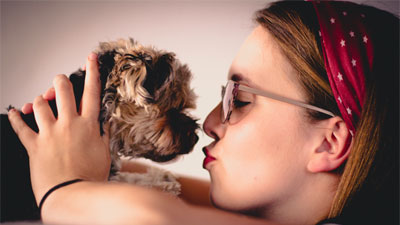 Help & AdviceThe Art of Giving Your Dog a Kiss and The Dos and Don'ts
Help & AdviceThe Art of Giving Your Dog a Kiss and The Dos and Don'ts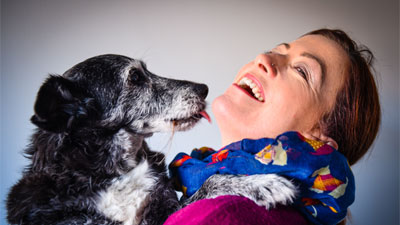 Help & AdviceTraining Your Dog to Give Kisses: A Step-by-Step Guide
Help & AdviceTraining Your Dog to Give Kisses: A Step-by-Step Guide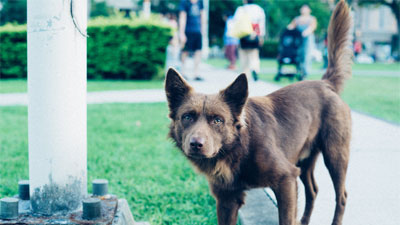 Dog BehaviorHow Do Dogs Show Their Emotions?
Dog BehaviorHow Do Dogs Show Their Emotions?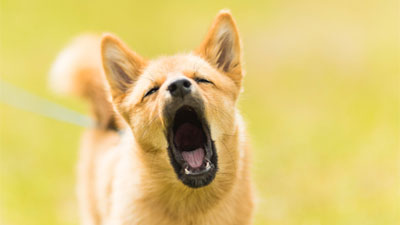 Dog BehaviorThe 6 Common Dog Sounds and Their Meanings
Dog BehaviorThe 6 Common Dog Sounds and Their Meanings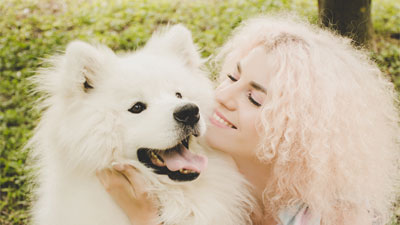 Dog Training Tips5 Easy Steps: How to Teach a Dog to Smile
Dog Training Tips5 Easy Steps: How to Teach a Dog to Smile